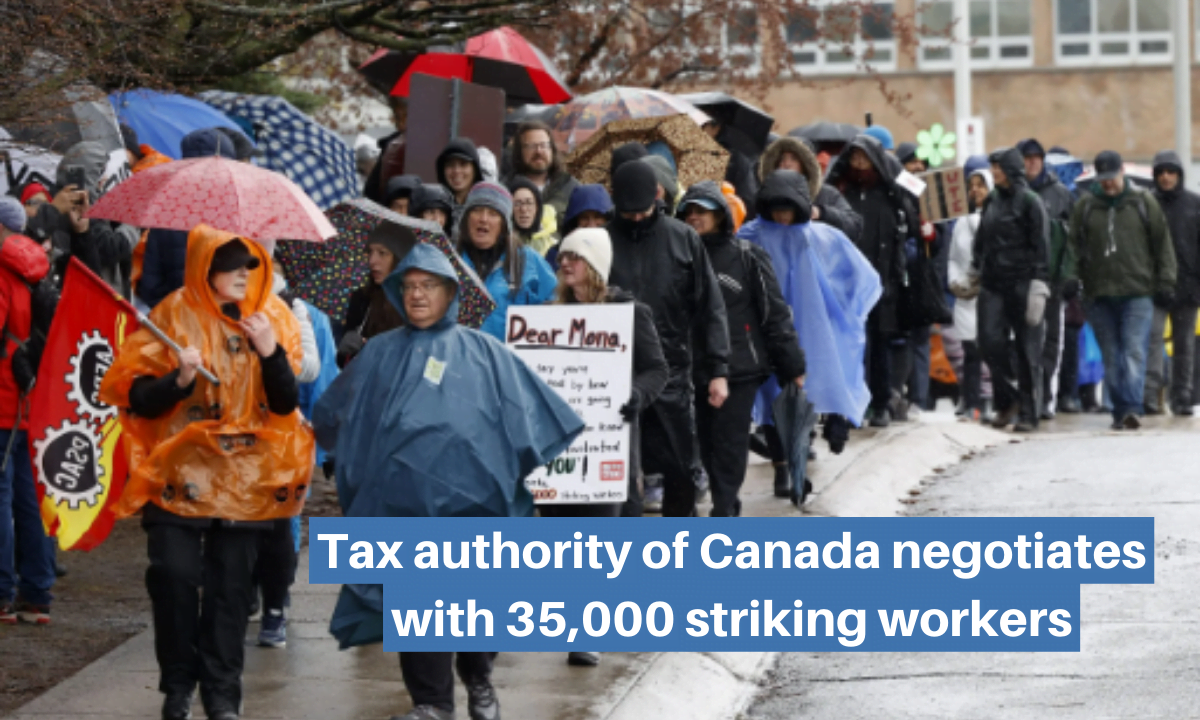The tax authority of Canada negotiates with 35,000 striking workers.
A strike that started in December 2021 has been ended thanks to a deal reached by the Canadian tax authority with 35, 000 of its striking employees. The largest public sector strike in more than ten years significantly disrupted Canada's taxation system and had an effect on how tax returns and payments were processed.
On April 19, more than 35 000 CRA employees and 120 000 other federal employees— roughly one-third of Canada's public sector workers— left their positions.
The CRA announced on Thursday that the four-year tentative agreement includes a one-time payment of$ 1,800( 2,500 Canadian dollars) as well as an increase of 11.5 percent over the course of four years, retroactive to 2021, for about 39,000 of its employees.
The union instructed its members to report to work on Thursday and added that managers must evaluate telework requests individually.
Due to the COVID-19 pandemic, many employees had become accustomed to working remotely, which had been a major sticking point.
The CRA wants to express its gratitude to both negotiation teams for their commitment and diligence during this round of negotiations, particularly over the past few weeks, according to a statement from the tax authority.
The CRA and the [union] were able to reach a tentative agreement that is both fair to employees and reasonable for taxpayers after many hours of negotiations.
The agreement between the Canada Revenue Agency( CRA) and the Public Service Alliance of Canada( PSAC) includes changes to the CRA's performance management system, job security improvements, and a 6% wage increase over the course of three years. Work-life balance, which was a major concern for the striking workers, will also be addressed as part of the agreement.
Numerous problems, such as wage increases, job security, and working conditions, led to the strike. The growing use of contract workers, who many workers claimed were underpaid and lacked the same level of job security as their unionized counterparts, caused them to express concern. Workers also voiced their displeasure with the CRA's performance management system, claiming it was unfair and failed to adequately account for factors beyond their control, like the complexity of tax returns.
Taxpayers in Canada experienced delays in processing their returns and receiving refunds as a result of the strike's significant effects on the tax system. In order to concentrate on crucial services like processing payments and maintaining the online tax system, the CRA had to suspend a number of services, including the processing of paper tax returns and refunds.
Both the CRA and the taxpayers, who can now rely on a fully operational tax system, are pleased with the strike's resolution. The agreement between the CRA and PSAC serves as a reminder of how crucial it is for all employees to receive fair pay, job security, and work-life balance. Additionally, it emphasizes the significance of having efficient performance management systems that account for the complexity of the work being done and its influencing factors.
Overall, Canada's tax system and the workers who depend on it are better off now that the strike has ended. The CRA and PSAC's agreement shows that, despite significant obstacles, compromise and dialogue can produce positive results.

Post a Comment